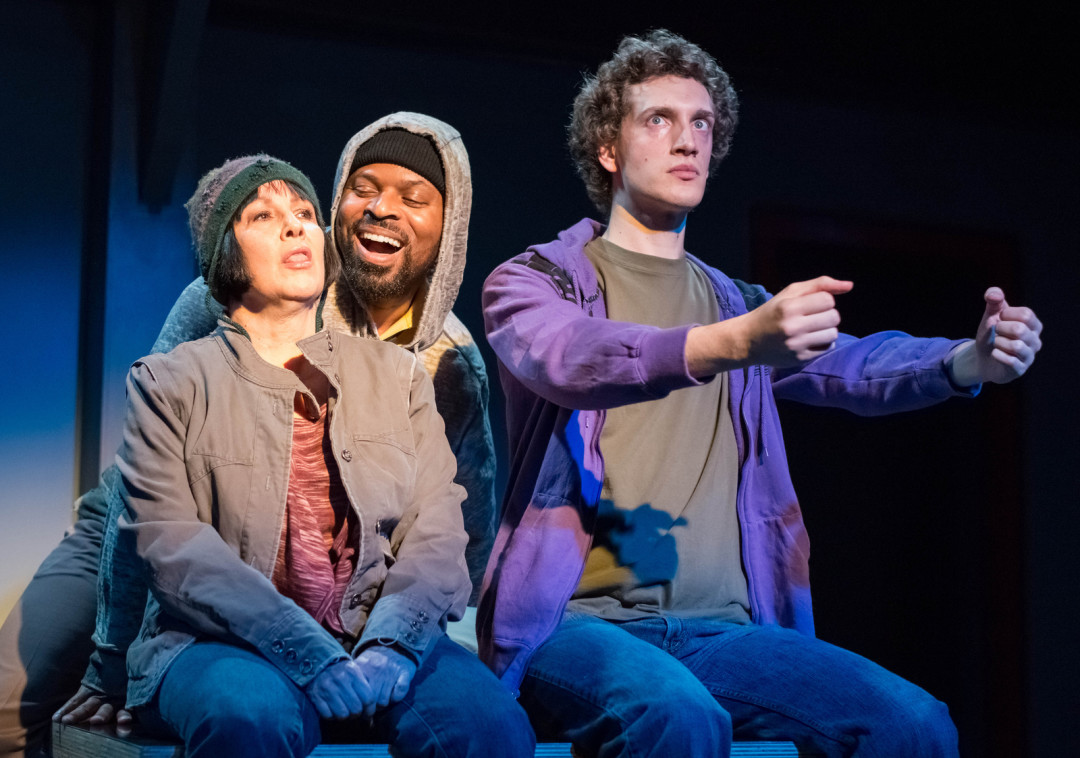Review: Portland Playhouse's "The Huntsmen"

Dean Linnard as Devon (right) picks up a pair of hitchhikers (Sharonlee McLean and Gavin Gregory) before bursting into song about how he only brakes for snakes. Photo credit Brud Giles.
Some of us sing in the shower. Others only sing after three rum-and-cokes at Chopsticks. Devon sings when he commits murder, and boy is his voice ever sweet.
The plot to Portland Playhouse’s new world premiere, The Huntsmen, sounds like a swinging suburban update of Sweeney Todd, but in the place of the barber, we have a teenager, and subbing for Sondheim’s operatic ensemble cast is an a cappella backing group. That’s right, a thriller about a teenage serial killer set to a doo-wop score. And man, it’s a gas.
Written by New Yorker Quincy Long and a hit at PCS’s JAW Festival last summer, our story begins with a rattled Devon (Dean Linnard) entering his father’s study late at night. His father, a defense lawyer more skilled in interrogation than parenting (played by Michael O’Connell with blunt American-male emotional ambivalence), slowly slivers a story out of his son. Seems Devon is part of a club that calls itself “The Huntsmen,” and its members have done something terribly wrong, leading to the death of a migrant girl. But the script is plump with foreshadowing and revelation, and it doesn’t take long for the audience to wonder if there’s something far more insidious to Devon’s discomfort, particularly after a rhetorical question from his dad incites Devon to admit to thinking about killing his father—and then elaborate in great detail how.
To go any further into the plot is really to give away a perversely fun jukebox fever dream romp through the mind of a killer. Suffice it to say that, with a cop on his tail, Devon goes on a killing spree that grows increasingly outlandish until we're left to question what is real and what is fantasy. But when his machete strikes, instead of showing the act, the production swings into a doo-wop song, the three supporting male actors (Gavin Gregory, Jared Miller, and O’Connell—all with fabulous voices) coming out in fedoras to provide the accompaniment to Linnard’s nimble, expressive tenor.
Contrapuntal to Long’s incredibly smart, humorous script, the song lyrics are vaguely universal, simple, even immature—like most hits are—with lines, such as “I’m off the deep end over you” and “I’ve got the music,” that are linked to the story on only the loosest metaphorical level. But the music has an intoxicatingly disassociative effect, both for Devon, who only truly comes to confident life when he’s singing, and for the audience—so much so that you start to anticipate the murders for the new musical numbers they’ll unleash. Indeed, the most troubling aspect of the play is how quickly it conditions us to snap our fingers for carnage.
New York actor Linnard plays Devon with awkward intensity, a frenetic ball of freak out that stares intently into the distance while his skinny arms scat in frenzies of staccato movement. With his gawky limbs, wild mop of hair, and tense, shoulders-pulled-back posture, he comes across almost as a cartoon killer, further deboning what could easily tilt into too gruesome a tale.
Under the direction of Long’s wife, Kathleen Dimmick, the production moves with a brisk, tight pace, the supporting cast coming and going with scene and song on the minimalist set. And the cast is uniformly strong, nailing the humor, hitting their notes, and still holding the tension, although Sharonlee McLean stands out as Devon’s brusque, no nonsense mom who doesn’t even pause when she wakes to find him holding a machete over her bed. (One unresolved twist is the fact that it was she who taught him his first doo-wop song: "They often call me Speedo, but my real name is Mr. Earl.")
Of course, a pitch perfect world premiere is as rare as a platinum record, and a few notes here fall flat. The second half diverges into a side story about becoming a musical star that fleshes out the themes, but is so out of place that it does little to further the plot. And the theatrical tool of skipping the actual murders that works so well to soften the horror is also used during Devon’s final confession, leaving us to wonder what he admits. The story jumps right to a jail scene, and a perfectly foretold ending, but it somehow feels unfinished. We are waiting for some final revelation, some final twist that would function like a key or a coda to our diabolical hero, but instead of leaving questioning the things I felt like we were supposed to question—what drives his rampage, what is real and what fantasy—I left questioning why ultimately we should care about this boy’s perverse tale.
Which is only to say the song could use a little refining of its message. But Portland Playhouse sure nails it on rhythm, tone, and joyous swing, leaving us mainly to ask: should we be concerned that two of the funnest plays of the season are stories of serial killers?
